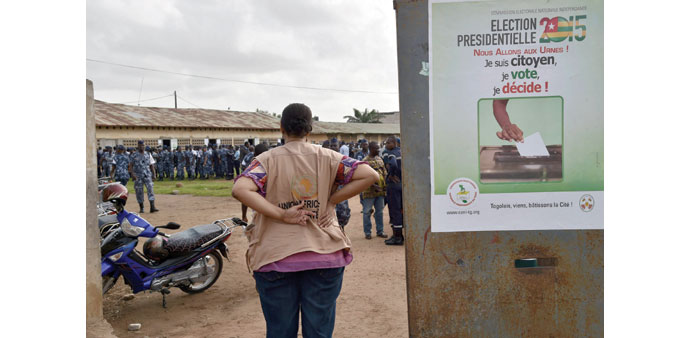An African Union election observer stands next to a poster reading ‘2015 presidential election, go to the polls, I am a citizen, I vote, I decide’ at a polling station in Lome as Togolose law enforcement officers voted yesterday in the presidential election seventy-two hours ahead of the rest of the population.
DPA/Lome
Five candidates will compete for Togo’s highest political office in elections expected to extend the 10-year-rule of President Faure Gnassingbe. Gnassingbe, 48, is likely to gain a third mandate, following in the footsteps of his father, Gnassingbe Eyadema, who ruled the small West African nation rich in phosphates, limestone and marble for 38 years.
Gnassingbe junior was installed as president by the army in 2005 after his father died. He briefly stepped down under international pressure but won a hotly contested election months later and was re-elected in 2010.
Gnassingbe’s ruling Rally of the Togolese People party blocked several attempts to limit the president’s term in office in the nation of 6.8mn people.
Gnassingbe is the frontrunner mainly because the divided opposition has been unable to agree on a joint candidate who would be able to garner enough votes to pose a threat to the Gnassingbe candidacy.
Main challenger Jean-Pierre Fabre, 63, leads opposition coalition Combat for Political Change (CAP) is believed to have the best chances.
Former education minister Aime Tchaboure Gogue, 68, who heads radical opposition party Democrats Alliance for the Integral Development, will also compete for the presidency.
The two other candidates are soldier-turned-businessman Gerry Komandega Taama, 40, whose New Togolese Engagement party enjoys the support of the youth, and former human rights activist and lawyer Tchassona Traore, 55, who leads the Citizen Movement for Democracy and Development party and is campaigning for constitutional reforms.
Roughly 3.5mn people are registered to cast their vote during the presidential polls on Saturday.
Initially scheduled for April 15, the election was delayed by 10 days after opposition parties said the electoral roll included thousands of double registrations by Gnassingbe supporters.
The candidates later agreed on an updated but still “imperfect” voter list.
Despite the irregularities, voters are likely to see Gnassingbe as a safe vote that ensures peaceful elections. Many Togolese have vivid memories of the post-election violence in 2005 that killed more than 500 people.
The incumbent also has support because he initiated numerous infrastructure projects, including new roads, major renovations to the port in the capital, Lome, and a new airport.
Gnassingbe also started to revive Togo’s tourism sector by building several new hotels, including the luxurious, 100m tall 2 Fevrier (February 2) flagship project.
The European Union is planning to fund 1,200 observers, while the Economic Community of West African States and the African Union will send their own monitoring teams. Provisional results are expected by May 1, with final results being announced on May 3, according to the electoral commission.

